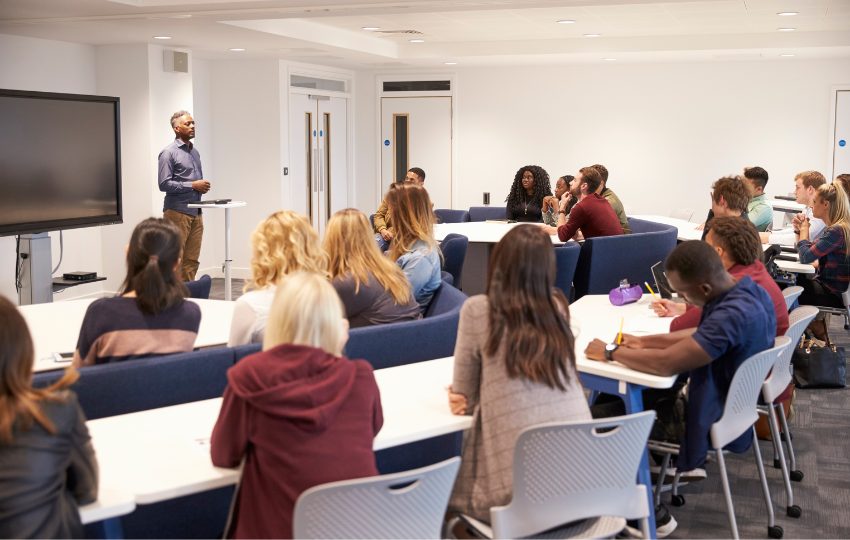Education
Educators Innovate Environmental Curriculum for Future Teachers

A new initiative at McGill University seeks to reshape environmental education for future teachers by focusing on collaborative course design. Led by Blane Harvey, an Associate Professor in the Department of Integrated Studies in Education, this approach aims to equip educators with the skills to address the pressing challenges of climate change through innovative teaching methods.
Over the past four years, Harvey has been at the forefront of developing environmental and sustainability education courses, working alongside graduate and undergraduate students, schoolteachers, and community members. This collaborative model emphasizes the co-creation of knowledge, enabling participants to engage across disciplines and cultivate a shared understanding of sustainability issues.
Transforming Environmental Education
Harvey noted that traditional course design often limits perspectives, as a single lecturer typically selects reading materials and assignments. In contrast, the new approach invites diverse voices into the curriculum development process. Stephanie Leite, a PhD candidate and Vanier scholar, played a key role in co-creating three of the four courses developed by Harvey’s team. She highlighted the importance of integrating various backgrounds and expertise in the course design, stating, “Understanding and responding to these complex challenges requires diverse voices and perspectives.”
In their recent study, Harvey and his team outline how they have incorporated these principles into McGill’s Faculty of Education. By including individuals with different experiences and viewpoints, the collaborative process has resulted in more comprehensive course content and interactive classroom activities. This method aims to model the benefits of cooperation, fostering a richer learning environment for students.
Challenges and Future Directions
Despite the success of this co-design model, Harvey and his team recognize several structural barriers that hinder its broader implementation. These include challenges related to securing University funding for collaborative partnerships and navigating rigid academic guidelines. Harvey expressed a commitment to addressing these obstacles, stating, “We hope to work with University and Faculty leaders to study and address structural barriers we encountered.”
The group has identified the Sustainability Education Fellows Program as a promising initiative, where educators collaborate to design or redesign sustainability courses with input from peers across various fields. Harvey recently received a grant from the Social Sciences and Humanities Research Council of Canada to lead an international study focusing on campus-wide initiatives that support new approaches to teaching and learning for sustainability.
By prioritizing collaboration in educational settings, Harvey and his team believe they can not only enhance the quality of environmental education but also empower future teachers to tackle the complex issues surrounding climate change. As they continue to refine their approach, the hope is that this innovative model will inspire similar efforts across other departments and institutions, ultimately contributing to a more sustainable future.
-

 Science3 months ago
Science3 months agoToyoake City Proposes Daily Two-Hour Smartphone Use Limit
-

 Top Stories3 months ago
Top Stories3 months agoPedestrian Fatally Injured in Esquimalt Collision on August 14
-

 Health3 months ago
Health3 months agoB.C. Review Reveals Urgent Need for Rare-Disease Drug Reforms
-

 Technology3 months ago
Technology3 months agoDark Adventure Game “Bye Sweet Carole” Set for October Release
-

 World3 months ago
World3 months agoJimmy Lai’s Defense Challenges Charges Under National Security Law
-

 Lifestyle3 months ago
Lifestyle3 months agoVictoria’s Pop-Up Shop Shines Light on B.C.’s Wolf Cull
-

 Technology3 months ago
Technology3 months agoKonami Revives Iconic Metal Gear Solid Delta Ahead of Release
-

 Technology3 months ago
Technology3 months agoApple Expands Self-Service Repair Program to Canada
-

 Technology3 months ago
Technology3 months agoSnapmaker U1 Color 3D Printer Redefines Speed and Sustainability
-

 Technology3 months ago
Technology3 months agoAION Folding Knife: Redefining EDC Design with Premium Materials
-

 Business3 months ago
Business3 months agoGordon Murray Automotive Unveils S1 LM and Le Mans GTR at Monterey
-

 Technology3 months ago
Technology3 months agoSolve Today’s Wordle Challenge: Hints and Answer for August 19









